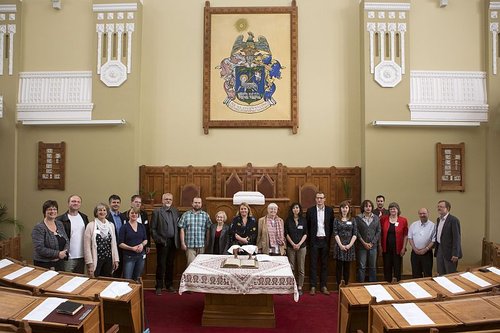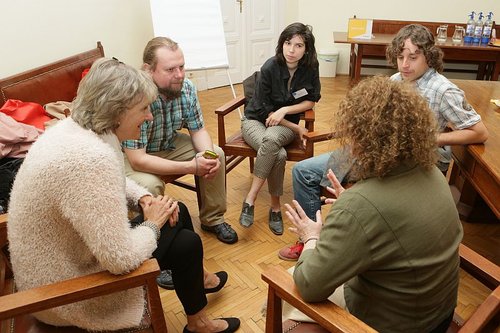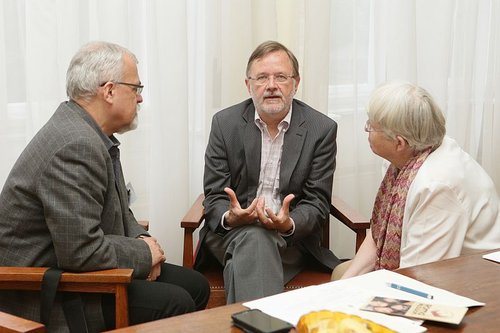Ecumenical Journey for Mission Continues
2015. június 01., hétfőThe Reformed Church in Hungary (RCH), the Protestant Church in the Netherlands (PKN) and the Evangelical Church of Czech Brethren (ECCB) came together in Budapest on 19th-21st of May for an exchange program hosted by the Reformed Church in Hungary.
One year after the three churches PKN-ECCB-RCH met in Utrecht, Netherlands to lay groundwork of a three-year partnership project for the benefit of the European Region of the World Communion of Reformed Churches that focuses on finding new ways to carry out mission in secularised environment. The common journey and three years cooperation of the “standing” delegations counting 6-8 people from each church follow the “we learn as we go” concept.

In the framework of the Hungaian program, on the 19th of May the trends of religiosity in Hungarian society were introduced in a meeting at the Károli Gáspár University of the Reformed Church in Hungary where they listened to three presentations given by Dr. Márton Csanády, Professor of Sociology and Ádám Hámori, Associate Professor of Sociology, respectively head and member of the Committee on Church Sociological Research. The first was a presentation about the findings of a recent Church Sociological Survey initiated by the Synod of RCH, the second a comparative reflection on the trends of Religiosity in Europe. The group was introduced also to the results of the work of the Church Revision Committee of the RCH which after 2 years of sincere reflection and dialogue submitted its final report, a detailed action plan focusing on the missionary renewal of the congregations last November to the Synod of RCH.
"Heaven and earth will pass away”, but “Jesus Christ is the same yesterday, today and forever.” The question of the future of the church is therefore whether it is and remains in Christ. All of our good decisions come from the knowledge of God and the obedience to the Holy Spirit. We regard “Missio Dei” (God’s mission) as the most decisive theological concept and perception for the church’s future. It includes the recognition that God’s nature is characterized by the existence in mission. The Father sends the Son, and the Father and the Son send the Holy Spirit. The role of the church is no other than to join God’s saving mission for the world. (Excerpt from the short version of the Action Plan of the Church Revision Committee)
On understanding the daily life and future perspectives of the RCH, the 20th of May provided an opportunity to visit two congregations, so as to learn about two ministries of the church. The first congregation they visited was the Buda Reformed Church, which is a mission oriented “city” congregation. The Head Pastor Rev. Dávid Illés, also Dean of the Budapest-North Presbytery led the group with a short devotion, and introduced the work of the both the congregational and Presbytery level. The second congregation was the Salétrom Street Reformed Congregation, where the participants met Rev István Lakó, the Roma Mission Leader, Krisztina Deme relogious teacher and learnt about the Roma Mission Project of this congregation. The two presentations were greatly received and ignited the group’s interest in regards to specialized ministries of the RCH. Dóra Kanizsai-Nagy the Director of the Refugee Ministry of the RCH introduced the work and challenges of the ministry and led a vibrant discussion on the churches’ work among migrants throughout Europe. Rev. Eszter Dani, Head of the Mission Department and Laura Velkey, Coordinator of HEKS (Swiss Church Aid) related congregational Roma projects highlighted the work of RCH among the Roma. Theological reflection, an overview of the Roma Strategy of RCH and sharing of practical experiences and personal stories were equally part of the presentation.
"Empowered by the Holy Spirit, the Reformed Church in Hungary (RCH) as a sign and agent of God’s Kingdom will be a church of personal and social transformation, a community where irrespectively of origin or race, people can experience the welcoming, reconciling and healing power of the Gospel of Jesus Christ.”
“The basic attitude of the church’s ministry among Roma is determined by the value and dignity of the man as a creature. God created man to live in loving community (communio) with Him and each other, and the evolution for this community glorifies Him. All ethnical, economic, social-based distinction, hierarchical or patronizing relationships harm this relationship-system and is a sin before God. It follows that the Church considers values to be important, such as mutual respect, acceptance, understanding, discovering each other’s values and enriching one another” (Excerpt from the concept for Roma ministry of RCH.)
On the last day of the visit, there was an evaluation meeting, opened by Balázs Ódor Ecumenical Officer where the whole group joined in a common prayer. The evaluation saw the delegates breaking up into small groups where they reflected on how the visit, and specifically on how the events touched, challenged, and encouraged them individually or as a church. The groups also discussed what they would like to see in a progress report, in terms of how they understand secularisation, mission of the church and cooperation based on “learn as we go in context of secularisation”.

The groups felt that secularisation varies from country to country, and society is more multicultural than anything else, with a hint of pluralism since ages past. In the course of time there seems to be a general distrust in society especially in Eastern European countries which they thought might probably be due to the common post-communist history they share. They felt that, this is because more and more Europe and especially Eastern Europe has become a Post-Christian Society, in that Christianity is not the mainstream culture anymore, but a matter of choice as opposed to tradition. Secularisation brings also an opportunity for a fresh start for a more authentic belief arising from a personal conscious decision and commitment, where as traditional forms of religiosity are vanishing. This also challenges the church to re-evaluate its identity from the traditional thought of being an institution to a new identity of being a community.
Most importantly this community needs to identify itself as one that is living the Gospel, and it is open, welcoming and interested in people and invites its members to witness in words and deeds. Inter-church partnerships can provide a space for conversation and listening to each other’s stories, which encourages individual churhes on their way of transformation and renewal.
After the groups reported their thoughts and discussions, the heads of the delegations shared their personal reflections and comments. Arjan Plaisier, General Secretary of the Protestant Church in the Netherlands mentioned of how interesting it was to see many things in the RCH and especially how touching it was to see the leaders of a congregations that they visited. Plaisier urged the RCH to encourage empower these people to continue their ministry. As for the Roma and Refugee Ministry the Church should be encouraged to keep working both locally and ecumenically for the wider society.

Joel Rueml, the Moderator of the Evangelical Church of the Czech Brethren passed also his greetings and thanks on behalf of the group and mentioned how important it is to be connected to the church family, being in contact with concrete people in sister churches. With these connections on reading stories from each other’s countries we have faces to the context that is being mentioned in news and current affairs.
Gerhard Reinighaus, Ecumenical Officer of the ECCB noted that it was inspiring to see the work amongst minorities especially hearing stories about Refugees and Roma ministries. One of the reasons that encourages the group to keep on journeying together.
The next and the last meeting will take place in Prague on 24th -26th of May 2016 and at the end of the three years process the delegations plan to formulate recommendations as to mission in secularized, post-Christian context and share them at the Area Council Meeting of WCRC with European reformed Churhes.
The two day program was ended with a Holy Communion service led by Rev. Zoltan Tarr, former Secretary General of the Reformed Church in Hungary.
Participants of the meeting were Arjan Plaisier General Secretary, Karin van den Broeke Moderator, Margriet Gosker, Marleen Blootens, Foka van de Beek, Nynke Dijkstra from the PKN, and Joel Ruml Moderator, Lia Valková Lay Moderator, Gerhard Frey-Reininghaus, Eva Benešová, Radim Žárský, Pavol Bargár and Petr Chlápek from the ECCB. On behalf of the RCH Zoltán Tarr reformed pastor, former General Secretary, Prof. Árpád Ferencz, Ádám Hámori, Szabolcs Lőrincz, Dóra Kanizsai-Nagy, Eszter Dani, Laura Velkey, Balázs Ódor Ecumenical Officer and Diána Erdélyi took part.
Njeri Wagana Hughes
Photos: Vargosz
Contact us
Click here if you are interested in twinning.
Reformed Church in Hungary
Address: H-1146 Budapest, Abonyi utca 21.
PO Box: 1140 Budapest 70, Pf. 5
Email: oikumene@reformatus.hu
English, German and Korean language services in Budapest
Links
Recommended articles
-
Pastoral Letter in the Light of the Pandemic
Bishop Dr. István Szabó sent a pastoral letter of encouragement to the ministers serving in RCH’s congregations, expressing his gratitude for the persistence and creativity of the pastors.
-
RCH Joins in Pope's Call for Prayer
RCH published the call on congregations to join the initiative of Pope Francis, supported by ecumenical organisations, to unite in praying the Lord’s Prayer on Wednesday, 25 March, at noon.
-
English Speaking Worship Services Online
Each Sunday at 11 AM (CET) the St. Columba's Church of Scotland in Budapest, the international community of RCH invites you to join the worpship service on its facebook page.
-
Test of Humanity and Companionship
Reformatus.hu asked Dr. György Velkey, Director General of the Bethesda Children’s Hospital of RCH about the challenges of health care workers and ways of prevention against the pandemic.
-
All Church Events Suspended
In light of the coronavirus the Presidium of RCH requested congregations to suspend all church events with immediate effect. Beside restrictions, it calls for prayer, sobriety and responsibility.











